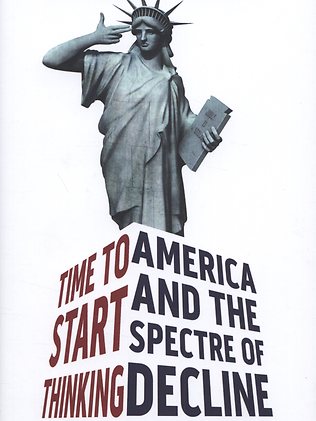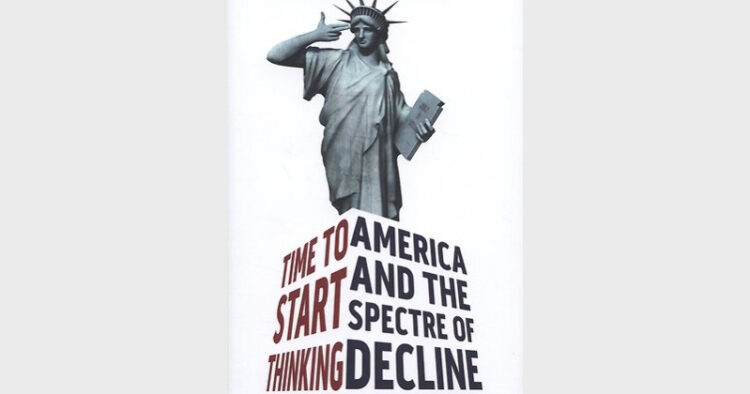Nidhi Mathur
 Time to Start Thinking: America and the Spectre of Decline, Edward Luce, Little, Brown, Pp 304 (HB), £ 12.80
Time to Start Thinking: America and the Spectre of Decline, Edward Luce, Little, Brown, Pp 304 (HB), £ 12.80
EDWARD Luce is a name that would ring a bell among the Indian media for he worked as Financial Times’ South Asian bureau chief, based in New Delhi between 2001 and 2005 and again as its Washington bureau chief from 2006 to 2011. He is now chief Washington correspondent.
Portraying a depressing picture of the current state of America, Luce provides an insightful narrative on the origins of United States’ current economic and political malaise. He presents a highly disturbing picture of the state of American society and of the total failure of America’s elite to come to grips with the real problems facing the country. This is a book determined to spark a debate among liberals and conservatives as it advances a carefully constructed and controversial argument, backed up by interviews with key players in politics and business. He says that the United States is losing its pragmatism and the consequences of which will soon leave the country in a mess.
He views varied issues that are set to affect the position of the United States the world over – the changing structure of its economy; the continued polarisation of American politics; the debilitating effect of the “permanent election campaign”; the challenges involved in the overhaul of the country’s public educational system; and the health or sickness of American innovation in technology and business.
He also explains that the United States in terms of how it governs itself is no longer very pragmatic. Here the ills afflicting the economy are mostly highlighted, especially the pronounced shift of America’s wealth from wages and salaries towards business income in the past quarter of a century. Corporate profits as a share of the American economy had climbed to their highest level since the eve of the Great Depression while wages had fallen to their lowest. For most middle-class Americans it meant year of declining incomes when the top one per cent “were reliving the Gilded Age”.
The author does not predict America’s collapse but expresses his scepticism about the country’s ability to sharply reverse her fortunes. Its title implies that America has not yet begun to think seriously about the consequences of where it is headed. Nowhere is this deficit more seen than in American politics. If the county is to restore its competitiveness, it will need to do many things, a few of which will be possible without a much more effective federal government. “In today’s world, smart government is a critical ingredient of national competitiveness. Unless America can address the government’s role in a more pragmatic light, it may doom itself to continued descent,” fears the author.
In a more detailed review, the first chapter looks at the changing structure of the US economy in which the impact of technology and globalisation has reduced its earning potential of a large share of the workforce while catapulting the most productive elites into a different hemisphere.
The second chapter looks at America’s steep challenge in overhauling public education. It asks whether America can refurbish a system of worker training that is shortchanging most of America’s labour force.
Chapter 3 looks at the health of America’s chances of remaining the world’s leader. Silicon Valley continues to be the most dynamic place on the planet to start up a company and the likeliest parent of disruptive technologies. But, if the valley’s secret source is to be found in its distinct blending of place, money and talent, then only “place” can be firmly relied upon to stay put.
The fourth chapter looks at the waning prospects for overhauling of the federal government, which, in spite of repeated efforts at reforms, remains part of the problem.
The fifth chapter looks at what is driving the continued polarisation of America’s politics. The author feels that it has become fashionable to talk of America’s “broken politics”, but unlike most fashions, this looks to be more durable.
Chapter 6 looks at the increasingly debilitating effect of the “permanent [election] campaign”, a trend Barrack Obama has exacerbated and in many ways come to embody.
The final chapter looks at America’s swindling options in a world where the pace is increasingly being set elsewhere. Many Americans believe it is still within their power to determine whether the country retains its global prominence, but it is within its power to reverse its increasingly plutocratic internal character.
The book concludes with what it begins, that is, can the fortunes of the middle class be revived? Must the Americans wait for another shock, along the lines of the 2008 Wall Street meltdown to stir itself into action?
(Little, Brown, Book Group, 100 Victoria Embankment, London EC4Y 0DY; www.littlebrown.co.uk)














Comments